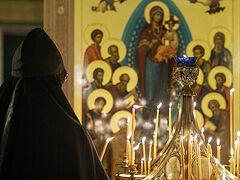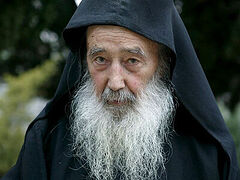 Artist: Greg Olsen. Photo: gregolsen.com
Artist: Greg Olsen. Photo: gregolsen.com
And when he had sent the multitudes away, he went up into a mountain apart to pray: and when the evening was come, he was there alone.
The same word is used twice, in order to more strongly emphasize the solitude that the Lord purposefully sought and which He found after sending the multitudes away. A mountain, solitude, darkness. These are the conditions under which a person most easily feels the nearness of the Spirit of God; these are the conditions for the sweetest prayer. All that our Lord Jesus Christ did, He did for our edification and salvation. For He came to earth in order to teach us not only with words, but by deeds, events, and by His every gesture and movement. He ascends the mountain, for on the mountain is the most profound quiet. He remains alone, for solitude means distance from this world. He prays in the darkness of night, for nocturnal darkness is a veil for the eyes, which most often hinder the mind and contemplation by darting from one thing to another. Christ’s prayer on the mountain also has its hidden, inner meaning. Sending away the multitudes, ascending the mountain, remaining alone in the darkness—what does it all mean? Sending away the multitudes means setting aside all imaginations of the world and all memories that trouble us and bind us to themselves, and having freed ourselves from the world, to raise our minds to prayer to God. What does it mean to ascend the mountain? It means raising the mind, heart, and soul to the Lord, near to God, in God’s presence. Whoever is drawn to the world with its endless interests, just as people while in a crowd cannot rise to the heights, where one remains one on one with His Creator. What does mean to be alone? It means an exposed soul, a soul just as it is. After departing from the world, a person may feel terrible loneliness. People who through disappointment with the world are led to this terrible loneliness usually take their own lives, if they are not able to rise to those heights where man finds God. What does darkness mean? It means the total absence of whatever there is of this world’s light. For the one who prays in solitude, this whole world is immersed in impenetrable darkness, in which for him the dawn of Heavenly light proceeding from God gradually gathers strength and illumines a new world that is infinitely better, more radiant than this world. Thus, these are essentially the four steps of prayer, and this is their inner meaning. In this event of Christ’s, these steps are represented in the images of sending away the multitudes, ascending the mountain, solitude, and darkness.
But this solitary prayer of our Lord Jesus Christ is even more edifying for us if we take into consideration what happened before it, and what is to happen afterwards. Before this prayer, the Lord worked the unprecedented miracle of multiplying the bread, and after it He walked on the waves of the sea as if it were dry land, to the very center of the sea. Although He worked this miracle by His own divine power—which He had before the creation of the world and which was always with Him even when He abided in time and in the flesh—He nevertheless prayed both in the temple with the people, and alone in the desert. It is hard for any of us to enter into the mysterious, personal motivations of these prayers of our Lord Jesus Christ. Of course, these prayers the Only-Begotten Son of the Pre-eternal Father continued also on earth, and witnessed to His immutable unity with His Father and the Holy Spirit. But besides this, the lesson that the Lord gives us through the example of His prayer is perfectly clear. Prayer must be preceded by good deeds, for then prayer helps. First we must witness our faith by good deeds, and only then confess them with words. Further, prayer brings benefit only when we intend to do a good deed and call out to God for help. Any prayer that contains a request for God’s aid in an evil deed is not only aimless, but also blasphemous. Doing evil and praying is the same as sowing tares and demanding that God grow wheat.
Before beginning any good deed, we must have recourse to God in prayer, ask for His grace, help and assistance, so that the work before us might be completed worthily and conscientiously. At the end of every good deed we should rise for prayer and give thanks to God that He vouchsafed us to complete this work. In a word, everything good that we possess or have done, or experienced and seen, or heard and read—everything, without exception, should be ascribed entirely to God and not to ourselves, our own strength, mind, or righteousness. For we are nothing before the Lord. And if after such great miracles our Lord Jesus Christ shows meekness, humility, and obedience before His Father and the Holy Spirit, though being equal to Them according to eternity and nature, then how much more so must we show meekness, humility, and obedience towards our Creator, Who created us from nothing, and without Whose help we cannot exist even for a minute—never mind do anything good?



